

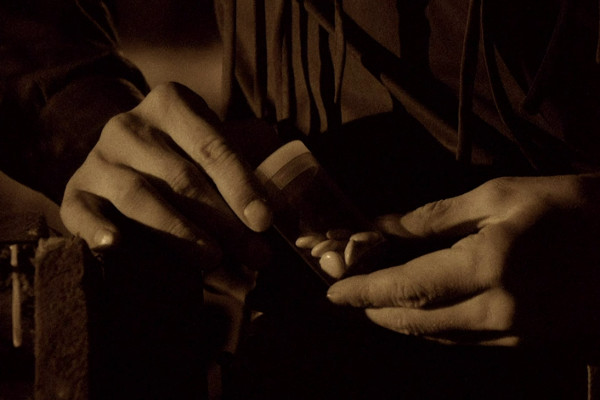
↑ Down 2 Places
The BluRay release was worked on by colourist Jonathan Wood, and, as mentioned elsewhere, in the main looks excellent. However, Wood regularly performs work that specialises in ensuring the continuity of colour balances and saturation across entire products, so that the stock basically looks the same throughout. This isn't actually too bad on the film stock of UFO, and much more noticeable on things like Doctor Who, where a mix of outside film and indoor video tape means that performers often have unnaturally red faces to make things look "uniform".
It's probably in the remit, though isn't, of course, restoration in its purest form, as it's not "restoring" the product, but altering it. Taking two separate artefacts and trying to use artificial means to make them look the same seems to be missing the point that these various materials aren't the same, and that attempting to prove otherwise brings about its own problems. In 2006 Deborah Grant recorded a DVD commentary with Wood for the Australian release of The Psychobombs, an exclusive commentary track that didn't make its way to the UK release. There Wood states that: "I did my best when I was doing the grading on these [...] to match in the saturation of the grass and things with the actual live action."
The reason for its mention here is that it's the episode where it's most obvious that grading work has been done. Even though many of the cast (Bishop particularly) were given "tan" make up, there is a distinct lobster effect to the skin tones throughout that can be distracting. Of course, the solution is to turn down the colour volume, but as it's mainly related to the red hues, that then causes its own issues with everything else being unnaturally muted as a result.
Yet it's impossible to fully detract from the brilliance of The Long Sleep, arguably the bleakest instalment of UFO, where the only let up is a bomb disposal expert who specialises in black humour. The last episode to be produced, it features explicit drug use and attempted rape, followed by the death of an innocent. There are times where UFO's off kilter sense of what incidental music should be can be distracting and dating - the attempted rape is played to another jazz bongo riff - but the series does, at least, possess its own unique identity in this regard.
Not all of it makes perfect sense. Set in 1984 (so the "present" of the entire series has taken place over a four year period) it has aliens coming back to the Earth to try to find a bomb they'd planted back in 1974. The question that this raises is why, if the aliens were capable of making a bomb that could destroy Britain in 1974, hadn't they simply built another in the decade following? And how likely is it that the houseboat on which the detonator was thrown would still be stationed there ten years later, and with the detonator still on board?
But it also reflects the series' pitch-black, pessimistic leanings when Straker speaks of an Earthquake in Turkey, 1974, that killed 80,000 people. Thankfully such an event never took place, but it's a fitting inclusion for a show that was always at its best when refusing to look up. Perhaps the only missed opportunity is that the girl who hid the detonator before falling into a coma is killed by something the aliens did to her. It would have been even more stark if she'd died as a direct result of the serum that Straker administered to her, knowing it could potentially kill her.
There was said to be talk of a second season of UFO, but falling ratings in the US put paid to it, and what was mapped out as a follow-up eventually became the somewhat sterile Space: 1999. How true this is is open to question, but the season of UFO we did get is very special indeed...
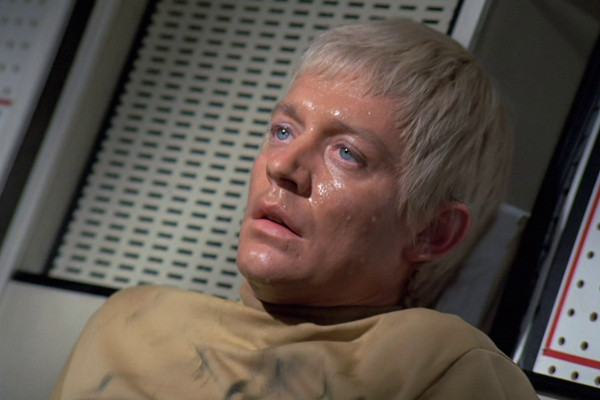
↓ Up 9 Places
Preconceptions can play a part when watching a TV series. Gerry Anderson will always be known first and foremost as a maker of children's puppet serials, which, while an admirable profession, can be a distracting mindset to take into a series like UFO, which utilised this modelling skillset. Yet while some of the models look a little "clean", and you have to suspend disbelief to pretend that they're in the same reality as the actors, they're actually very well done. In particular, the explosions are genuinely spectacular, and were, in real life, genuinely dangerous to achieve.
But it's not just the models... here, a story about a crashed sub with a claustrophobic Straker lends thoughts to two theories: 1. The claustrophobia is just a fairly cheap plot function, and B. The "crashed" sub interior is achieved via the camera being tilted, otherwise known as a Dutch angle. In actual fact, neither are true. Ed Bishop recorded a commentary track for Sub-Smash in January 2002, where he reveals that not only was it the set that was actually tilted, but that the inspiration for the episode came from the knowledge that Bishop and Dolores Mantez both suffered from claustrophobia in real life. With no one else in the commentary booth to bounce off, Bishop does fall into a habit of watching the story and forgetting to speak, but when he does he's enthusiastic. In all, while far from essential listening, it does make it feel as if you're watching the episode with a warm friend.
So Sub-Smash isn't without its faults... narratively it doesn't contain many surprises (a "will Straker get out alive?" plot is pretty self evident in the answer, even for a show as dark as this) and the choice of blue screen for shots where Paul Foster looks out over the blue ocean was unfortunate. But what makes this episode far more than just a "functional" episode, and what causes it to rise so highly in this ranking is the final ten minutes, where Straker, losing his mind from lack of oxygen, has his life flash before his eyes, haunted by the tragedies that have befallen him. He thinks the words of a sea burial, and the serial rewards moments of genuine profundity, such as Straker's final reflection that "That's what life's all about, I guess... the things we never say."
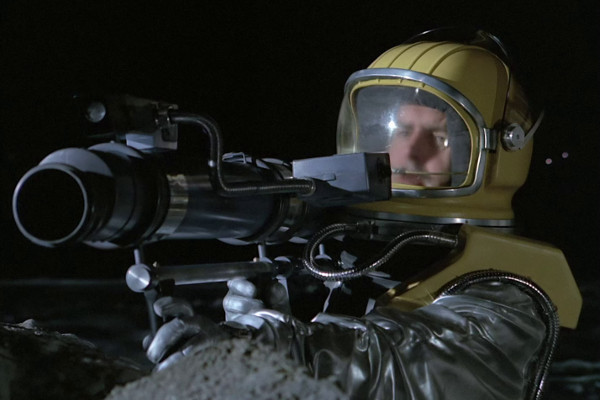
↓ Up 2 Places
An intriguing episode in that, unusually, it's left to a guest star to carry it. George Cole, forever to be known as Arthur Daley, here takes such a lion's share of the action that it's over twelve minutes before a regular character even appears.
Sometimes the leaps of logic involved in the plot don't hold up to close scrutiny, but what really rewards is that it's the first episode that's truly downbeat. The sight of Cole dying alone on the moon and giving his love to his wife - unaware she's been killed, the information clinically withheld from him by Straker - is a chilling, perverse one.
While there are better episodes of UFO, this is what it specialised in more than the camp and the action sequences... human tragedy and offbeat resolutions. Just the third episode to be made, Flight Path showed early on that this series was prepared to go a little darker than most...
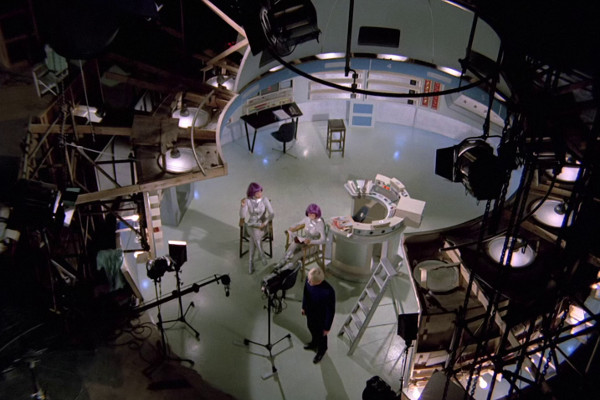
↑ Down 1 Place
When an alien rock gives the inhabitants of Moonbase hallucinations, one of the Interceptor pilots goes insane and believes he's in a Western, fighting Mexican bandits. It's a wild, out-there plot, that many other series would have mined for broad laughs. However, UFO being UFO, we see the reality soon after... he's been punching the female staff, and one of his best friends is on the floor coughing up blood and dying.
Things take an even weirder turn when the rock gets back on Earth, and Straker hallucinates that he's the star of UFO, the TV series. Of course, such meta/fourth wall breaking content isn't unique to UFO, and has been done in series before and since, including a show covered on this site, Gurney Slade. But UFO does it better than most, with a real sense of style.
One slightly unfortunate element is that all of the cast play "themselves", using their own names, but Ed Bishop already shared the same first name as his character, so this couldn't be done. This said, Ed Bishop was only his stage name, and his friends still called him George, so maybe that could have been substituted instead? It's a trivial point, though, and the odd, vaguely Prisoneresque episode gets by with everyone calling Straker "Howard".
"Howard" finds himself watching the tragedies of his own life as rushes on a cinema screen, the death of his son just an "episode" ready to air. There's an incredibly neat touch where the line General Henderson was saying when Straker goes into/comes out of his hallucination was "let's get back to realities", and another classic episode wraps. In its finest moments UFO can be such a starkly brilliant series that a lightweight, almost comedic concept can showcase a series of psychological torture.

↓ Up 1 Place
A fine example of a relatively mundane episode being lifted into something far greater by a classic ending. Alan Pattillo was usually behind the camera for Gerry Anderson productions, and this was the only episode of UFO he'd penned. A shame, as he provides the series with a devastating conceit: when an adulterous wife and her new lover plot to kill her husband, they shoot an alien instead.
Managing to piece everything together, the central trio of Straker, Foster and Freeman are left with a dilemma: return the amnesia-drugged couple back into society and they'll doubtless try to kill the husband again. Yet the only alternative is to reveal to wider authorities the existence of UFOs, not to mention the problem that this is only (correct) speculation on the part of the SHADO operatives, and that technically the couple haven't broken any law.
Those expecting some amazing get out clearly aren't aware of what kind of series UFO really is. What makes the climax so disturbing is the casual resignation of the nominal "heroes", contrasted with a final, haunting shot of the wife standing over her husband's gravestone, the end credits and theme playing over her. Chilling.

→ No change
Very few series have so enjoyed torturing their lead character as much as UFO. It's possible to feel sympathy for Straker, given that his son only had an accident due to both his ex-wife Mary's insistence that he should leave without saying goodbye to him, and her failure to stop their son running out into the middle of a road. Yet a series of events lead to Straker being the only one able to save the boy's life after he's hit by a car, and the demands of his job prevent this from happening.
While Ed Bishop is fine at the cold, clinical stuff, the emoting he's called on to do at the climax is notably just outside of his range. Yet this is possibly the point, as Straker is a man who lets his young son watch a movie about strangulation being filmed and not realise that it's inappropriate. Philip Madoc (credited with an extra L in his name) is left standing around awkwardly as the new man in Mary's life, called upon to repeatedly step out of frame so as not to spoil the blocking of shots.
As with all UFO, there's some moderately corny and misjudged sequences, not least the young Straker accidentally looking into camera during one scene. Yet the tangible pain at the climax and the concept of the series becoming this dark is a punch to the gut that's impossible to forget. A Question of Priorities didn't quite make it to the top spot, but in terms of emotional rawness it's in a league all its own.
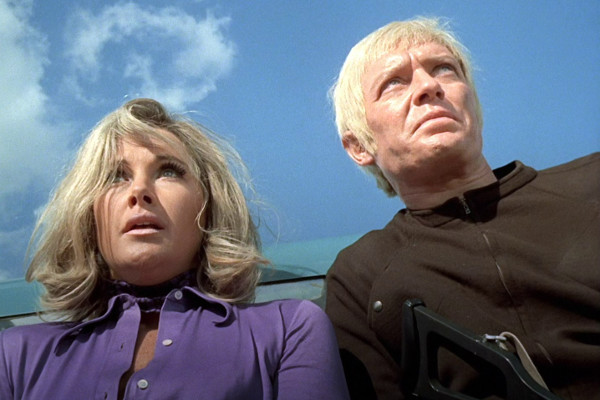
→ No change
One of the last three episodes to be produced, Timelash was completed between July and August 1970. As this episode, thoughtfully shot by Cyril Frankel, features Straker and Lake trapped inside a "millionth of a second", then it's questionable as to how far the series could have continued once the reality of it has extended into pure sci-fi, however brilliant that pure sci-fi might be.
Considering how the second season of The Outer Limits took out a lawsuit over alleged similarities between an episode and The Terminator, it's somewhat amazing that this episode didn't receive the same fate. The idea of time being slowed almost to a standstill, with characters existing outside of it, is fairly traditional SF gimmickry. But not only are the basic plot similarities between this and the 1965 Outer Limits episode The Premonition so close that it would be very unlikely to be a coincidence, they both even feature the revelation of that "millionth of a second".
It's like leaving a definite fingerprint of the source, very similar to Ray Parker Jr. starting his Ghostbusters theme with a "revving up" sound that also featured at the beginning of Huey Lewis's "I Want A New Drug". Sadly for Parker Jr. he wasn't as lucky as Terence Feely apparently was here, and had to settle out of court.
Yet while the old motto about "genius steals" can cover most of it, what really matters is that Timelash is simply better. Premonition is a dreary, badly-acted episode that was slated on this site as "first class idea, third-rate execution"... whereas Timelash takes that inspired innovation and makes it something very special indeed. Although the villain of the week is just a ranting maniac with little motivation, it scarcely matters... the plot is what drives this one, and all the drama is brought out of this devastating conceit, with it all told as a flashback and the viewers having to wait until they've caught up.
It's superb stuff, though again, as with Reflections in the Water, mention has to be made of the BluRay edition being too good - any scene with Straker fighting is incredibly obvious in its use of stunt doubles when seen under higher definition. Yet such matters can't hold back the full brilliance of this one, or prevent it from taking the top spot.